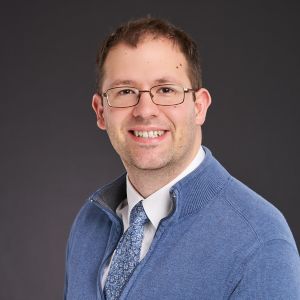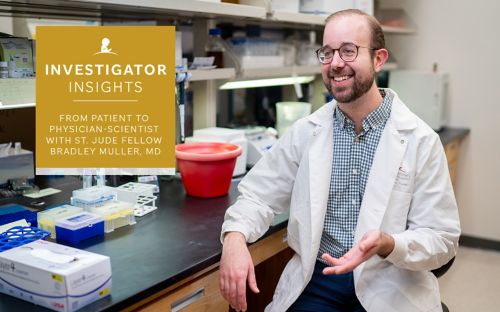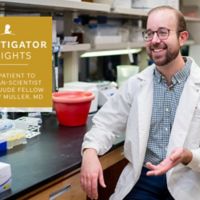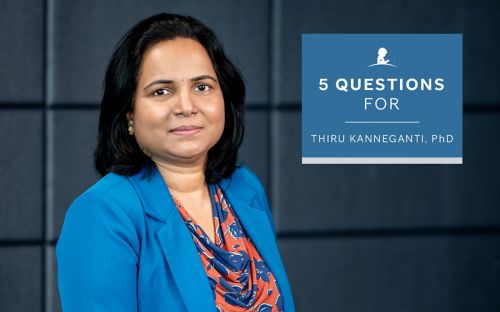5 Questions for Stephanie Dixon, MD, MPH
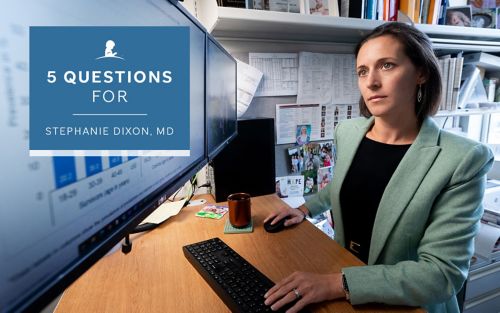
Stephanie Dixon, MD, MPH, is finding modifiable lifestyle factors to help childhood cancer survivors live longer, healthier lives.
1. Why have you focused on a career investigating childhood cancer survivors?
I was very drawn to the field of pediatric oncology early in my medical training and love working with this population as patients and survivors. Through work with patients and the experience of a close family member, I learned during medical school that the impact of treatment reaches far beyond the time of a “cure.” When I realized there was a field — survivorship — dedicated to identifying (and hopefully reducing) these late effects, I knew I wanted to be a part of that. I want to help patients not just to survive their cancer, which is an amazing achievement, but to thrive after cancer and live their fullest lives through the care we provide and the knowledge our research group generates.
2. Much of your work focuses on survivors’ life- and health-spans. What have you learned about how to protect survivors’ health?
I think there are many things we have learned, though some stand out. A major theme that comes up, which I frequently use in patient counseling, is that many of the health behaviors we recommend for everyone are even more important for survivors. In some ways, this isn’t surprising. Living a healthy lifestyle, from maintaining a healthy weight, to exercising regularly and following up with a primary care provider to avoid or aggressively manage high blood pressure, high cholesterol or diabetes, is good advice for anyone. However, it becomes more important as a survivor of childhood cancer, especially if therapy exposures put you at risk for cardiovascular conditions at a younger age. Many young adults forgo medical care and recommended screenings (including cancer-specific screenings for some survivors).
Survivors, their primary care providers and their support system must understand the need for their participation in routine care.
3. What do you wish more scientists and clinicians understood about survivors?
We are still learning about unique risks associated with cancer treatment. Continued investigations into the potential late effects of novel therapies are needed. For clinicians, I wish more providers understood that cancer survivors, especially those treated with intensive therapies during childhood, have a number of unique health risks that need attention even in young adulthood.
I also think this is an area where we are working to improve our ability to disseminate information to providers and survivors. For any clinician outside of pediatric oncology, survivors make up a tiny part of their practice. Part of the role of the survivorship research community is to help make providing comprehensive care for survivors as easy as possible.
4. What questions does your research address, and what discoveries have you made?
Some of my recent research has focused on how potentially modifiable cardiometabolic risk factors or behaviors differentially develop and impact the long-term health of survivors of childhood cancer. While many of these are common conditions in the general population and survivors, including high blood pressure, obesity or low levels of fitness, they truly affect survivors’ lives and well-being differently than the general population; they occur at a high enough frequency that we may be able to learn how to better detect and treat them in survivors.
Related to this, collaborative work I led using the Childhood Cancer Survivor Study identified that survivors of childhood cancer were dying of causes that are common in the general aging population. These included cancer, heart disease, stroke, and infectious causes at a younger age and faster rate than their age-matched peers. We also found that the presence of modifiable cardiovascular risk factors, including hypertension, diabetes, dyslipidemia and an unhealthy lifestyle, were associated with an increase in risk for health-related mortality.
Our work highlights the importance of future research focused on prevention and interventions for modifiable cardiometabolic risk factors in young survivors of childhood cancer to improve the health span and lifespan of our patients.
5. Where do you draw inspiration as an investigator to continue to study challenging topics?
What drew me to this field of research was the intersection of a unique population of patients, those impacted by cancer in childhood, and the wealth of knowledge and discoveries made in medicine. Survivors of childhood cancer grow into adults and frequently develop chronic health conditions at a younger age, necessitating early and aggressive management. I trained in both internal medicine and pediatrics during residency and loved the complexity of understanding multimorbidity that I had the opportunity to manage in older adults.
Further, there is such a wealth of evidence-based medicine developed in adult populations due to the large number of individuals acquiring disease as they age. During my training, I frequently considered if and how both the day-to-day management of cardiovascular risk factors in older adults and the latest and greatest advances in the medical management of conditions like advanced heart failure may impact survivors of childhood cancer.
The unique interaction between disease related to receipt of high-intensity therapy at a young age, a relatively small population of patients, and a history of cancer often leaves these individuals out of clinical trials. It is, therefore, difficult to evaluate efficacy or develop guideline recommendations tailored to their needs. Trying to understand how to best meet the needs of these teens and young adult survivors as they develop chronic conditions — often associated with aging in the general population — and consider the possibility of studying interventions to mitigate risk specifically for this group inspires me and holds my interest in advances in adult internal medicine as well as pediatric oncology.
Stephanie Dixon, MD, MPH, St. Jude Department of Oncology and Department of Epidemiology and Cancer Control, is a physician-scientist who has published extensively in the field of childhood cancer survivorship research while maintaining her clinical practice.
Her findings provide insights into how to affect the long-term outcomes of survivors, including:
- A healthy lifestyle (exercising, maintaining a healthy weight, and avoiding smoking and risky alcohol use) and having good control of cardiovascular risk factors (such as maintaining normal blood pressure) were associated with a significantly reduced risk of death in survivors, in The Lancet.
- Risk-stratified therapy for acute lymphoblastic leukemia has been successful in improving long-term patient health status, explaining previously incongruent results looking at patient treatments by decade from the 1970s-1999, in Cancer Epidemiology, Biomarkers & Prevention.
- Modern risk-stratified therapy, in addition to curing cancer, has reduced late morbidity and mortality in more recently treated patients long after treatment compared to a historical cohort, though they still experience more health issues than similar-aged siblings, in the Journal of Clinical Oncology.
